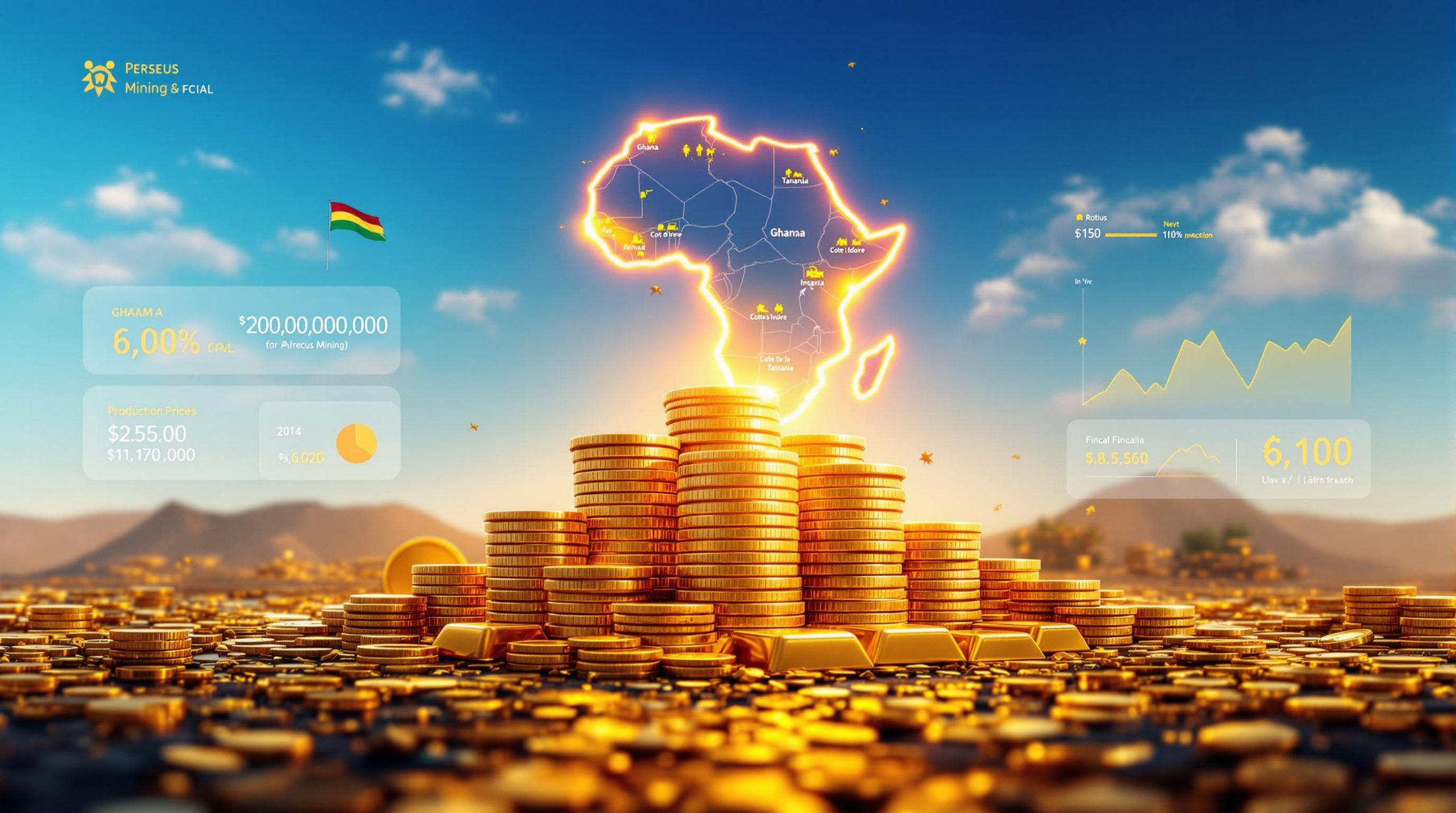US Sanctions on Congo Mining Firms: Tackling Conflict Minerals and Illegal Operations
The United States has recently imposed significant sanctions targeting illegal mining operations in the Democratic Republic of Congo (DRC), marking an important step in the ongoing battle against conflict minerals. These measures represent the latest effort to disrupt the flow of illicitly sourced minerals that fund violence and exploitation in one of Africa's most resource-rich yet conflict-prone regions.
What Are the Recent US Sanctions on Congo Mining Entities?
On August 12, 2025, the U.S. Treasury Department's Office of Foreign Assets Control announced sanctions against multiple entities involved in illicit mining operations in the Democratic Republic of Congo. These sanctions specifically target operations in Rubaya, a mineral-rich area in eastern Congo known for its substantial tantalum deposits.
The sanctions are designed to disrupt networks profiting from illegal mineral extraction while undermining legitimate supply chains that are critical to global industries, particularly electronics manufacturing.
Key Entities Targeted by US Sanctions
The Treasury Department's sanctions specifically target:
- PARECO-FF: Described as "a successor movement to an armed group with a history of destabilizing activities in the DRC"
- East Rise Corporation Limited: A Hong Kong-based company purchasing illicitly-procured minerals
- Star Dragon Corporation Limited: Another Hong Kong-based firm involved in illegal mineral trading
- Cooperative des Artisanaux Miniers du Congo: A Congolese mining company facilitating illicit mineral procurement
These entities have been sanctioned for their direct involvement in exploitative mining practices and the illegal mineral trade that undermines legitimate economic development in the region.
Reasons Behind the Sanctions
According to Treasury Department statements, the sanctioned entities are accused of:
- Imposing forced labor practices in mining areas under their control
- Executing civilians in territories they dominate
- Purchasing minerals obtained through illicit means
- Undermining legitimate supply chains for critical minerals vital for national defense
"The Treasury Department will not hesitate to take action against groups that deny the United States and our allies access to the critical minerals vital for our national defense," stated Under Secretary of the Treasury for Terrorism and Financial Intelligence John K. Hurley.
These sanctions represent a targeted approach to addressing specific bad actors rather than imposing broad restrictions that might harm legitimate mining operations in the region.
Why Is the DRC's Mining Sector Vulnerable to Exploitation?
The Democratic Republic of Congo's mining sector presents a complex challenge where tremendous mineral wealth exists alongside governance challenges and security issues, creating perfect conditions for exploitation.
Strategic Mineral Wealth in Eastern Congo
Eastern Congo, particularly the Rubaya region targeted in these sanctions, is described as "one of the world's largest sources of tantalum ore" according to industry experts. This strategic importance cannot be overstated:
- Tantalum is critical for manufacturing capacitors used in virtually all modern electronics
- The region contains significant deposits of other minerals classified as "conflict minerals" – gold, tin, and tungsten (collectively known as 3TG)
- These high-value minerals are often concentrated in remote areas with limited infrastructure
- The combination of high value and remote locations makes these minerals attractive targets for armed groups
This mineral abundance represents both the DRC's greatest economic asset and its most significant security challenge.
Governance Challenges in Mining Regions
Several factors make governing Congo's mining regions particularly difficult:
- Limited state presence in remote mining areas where government authority is often contested
- Porous borders with neighboring countries that facilitate smuggling operations
- Complex ethnic and political tensions that have fueled decades of conflict
- Challenging terrain that complicates security operations and monitoring efforts
These governance gaps create opportunities for armed groups and illegal mining operations to flourish, often with devastating consequences for local communities.
Recent Peace Developments
The sanctions announcement comes at a pivotal moment in regional politics:
- A recent DRC-Rwanda peace agreement aims to end years of deadly conflict
- The U.S. has backed diplomatic initiatives to stabilize the volatile eastern Congo
- Efforts are underway to end the occupation of mineral-rich territories by the Rwanda-backed M23 rebel group
- These developments could potentially reduce mineral smuggling operations if successfully implemented
However, experts remain cautious about whether these diplomatic efforts will translate into lasting improvements in mining sector governance.
How Do Conflict Minerals Impact Global Supply Chains?
The minerals at the center of these sanctions on Congo mining firms play a crucial role in global technology supply chains, creating complex ethical and security challenges for industries worldwide.
Critical Minerals from Congo in Global Technology
Tantalum's essential role in global industries cannot be overstated:
- Tantalum capacitors are critical components in smartphones, laptops, automotive electronics, and medical devices
- The mineral's heat resistance and conductivity properties make it irreplaceable in many applications
- When sourced through illicit channels, these minerals create significant compliance and ethical risks for technology companies
- Industries dependent on these minerals include consumer electronics, automotive, aerospace, and defense
This creates a challenging dynamic where industries desperately need these minerals while facing increasing pressure to ensure ethical sourcing.
Financial Flows Supporting Armed Groups
The illicit mineral trade represents a significant funding source for armed groups operating in eastern Congo:
- Mineral smuggling has reached unprecedented levels in recent years according to regional monitors
- Cross-border movement of resources creates complex money trails that are difficult to track
- Armed groups use mineral profits to purchase weapons and maintain control over territories
- Estimates suggest billions in potential revenue are diverted from legitimate channels annually
These financial flows create a self-sustaining cycle of conflict that has proven difficult to break despite years of international efforts.
US Strategic Interests in Mineral Security
The sanctions highlight growing U.S. concerns about securing ethical mineral supplies:
- The Treasury Department has explicitly linked these sanctions to protecting critical mineral supply chains
- Under Secretary John K. Hurley emphasized national defense concerns in his statement
- These actions represent part of a broader critical minerals strategy to secure ethical mineral supplies amid growing global competition
- The sanctions reflect increasing awareness of mineral security as a national priority
The focus on Hong Kong-based companies also suggests concern about potential alternative supply chains that might circumvent existing regulations.
What Are the Consequences of These Sanctions?
The impact of these sanctions will extend beyond the specifically targeted entities, potentially reshaping mineral sourcing practices and market dynamics.
Immediate Effects on Targeted Entities
Sanctioned companies and groups face severe operational restrictions:
- All U.S.-based assets belonging to sanctioned entities are frozen
- U.S. persons are prohibited from conducting business with the sanctioned entities
- International banking restrictions often follow U.S. sanctions designations
- Reputational damage can affect business relationships globally, even with non-U.S. partners
These consequences create significant operational challenges for the targeted organizations, potentially disrupting their illegal activities.
Broader Market Implications
The sanctions signal increased scrutiny that could affect wider mineral markets:
- Companies sourcing minerals from eastern DRC face heightened due diligence expectations
- Supply chain disruptions may occur as companies reevaluate sourcing practices
- Price volatility could affect tantalum and other minerals from the region
- Legitimate mining operations may face increased compliance costs and scrutiny
These market effects highlight the challenge of targeting bad actors while minimizing collateral damage to legitimate operations.
Enforcement Challenges
Despite the sanctions' importance, significant challenges remain in implementation:
- Tracing mineral origins through complex global supply chains remains difficult
- Shell companies and alternative trading routes can circumvent restrictions
- Remote mining operations are inherently difficult to monitor effectively
- International coordination between enforcement agencies requires sustained commitment
These challenges underscore why sanctions alone cannot solve the conflict minerals problem without complementary efforts.
How Do These Sanctions Fit Into Global Efforts to Combat Conflict Minerals?
The new sanctions represent one component of a multifaceted international approach to addressing the conflict minerals issue.
International Regulatory Frameworks
Several key regulatory frameworks shape the global response to conflict minerals:
- The Dodd-Frank Act Section 1502 requires U.S. companies to disclose use of conflict minerals
- The EU Conflict Minerals Regulation imposes supply chain due diligence requirements
- The OECD Due Diligence Guidance provides a framework for responsible mineral sourcing
- UN initiatives have addressed resource-fueled conflicts through various resolutions and programs
These complementary approaches create a regulatory environment that increasingly demands transparency and accountability throughout mineral supply chains.
Industry Response and Certification Efforts
Industries have developed various initiatives to address conflict mineral concerns:
- The Responsible Minerals Assurance Process (RMAP) provides third-party auditing of smelters and refiners
- Blockchain and digital traceability solutions are being deployed to track minerals from mine to market
- Industry consortiums collaborate on developing supply chain transparency standards
- Third-party verification systems help companies demonstrate compliance with sourcing requirements
These industry-led efforts reflect growing recognition that ethical sourcing is becoming a business imperative, not just a compliance issue.
Humanitarian and Development Considerations
Effective solutions must balance security concerns with humanitarian and development realities:
- Sanctions and regulations can inadvertently impact artisanal miners' livelihoods
- Alternative development programs aim to create sustainable economic opportunities
- Formalization of artisanal mining sectors can help bring operations into legitimate supply chains
- Community-based monitoring programs can help ensure mining benefits local populations
This balanced approach recognizes that security-focused measures alone cannot address the complex socioeconomic factors driving conflict mineral trade.
What's Next for Congo's Mining Sector?
The future of Congo's mining sector depends on how effectively security improvements, governance reforms, and economic development can be integrated.
Potential Reforms and Improvements
Several reform pathways could help address underlying issues:
- Strengthening governance in mining regions through capacity building and institutional development
- Expanding traceability programs to cover more mining sites and mineral supply chains
- International support for comprehensive security sector reform
- Investment in legitimate mining operations with proper environmental and social safeguards
These reforms require sustained commitment from both Congolese authorities and international partners.
Ongoing Security Challenges
Despite recent diplomatic progress, significant security challenges persist:
- Multiple armed groups continue to operate throughout eastern DRC
- The Rwanda-backed M23 rebel group maintains control over territories with mineral resources
- Implementation of recent peace agreements faces political and logistical hurdles
- Mineral smuggling networks have proven adaptable to enforcement efforts
These security challenges highlight why comprehensive approaches that address root causes are essential for lasting progress.
Investment Outlook
The evolving situation creates a complex landscape for potential investors:
- International mining companies must carefully assess risks in affected regions
- Responsible investment opportunities exist alongside significant challenges
- Companies with robust due diligence capabilities may gain competitive advantages
- Critical mineral demands create economic incentives for developing legitimate supply chains
The tension between mineral demand and ethical sourcing requirements will continue to shape investment decisions in the region. Furthermore, mining industry trends indicate a growing emphasis on sustainability and responsible sourcing practices.
FAQ: Understanding Sanctions on Congo Mining Operations
What minerals from the DRC are considered "conflict minerals"?
The primary conflict minerals from the DRC include:
- Tantalum (derived from coltan ore): Used in electronic capacitors
- Tin: Used in circuit board soldering and food packaging
- Tungsten: Used in metal wiring, electrodes, and military applications
- Gold: Used in electronics, jewelry, and as a financial asset
These "3TG" minerals are specifically monitored due to their historical connection to funding armed groups and human rights abuses in Congo's mining regions. In addition, gold market trends show increasing scrutiny of supply chain origins.
How do these sanctions differ from previous measures against conflict minerals?
These sanctions represent a more targeted approach compared to earlier efforts:
- They focus on specific entities rather than imposing broad regional restrictions
- They directly name companies and groups involved in illicit activities
- They complement rather than replace existing due diligence requirements
- They address both armed groups and the companies purchasing from them
This targeted approach aims to minimize impacts on legitimate operations while focusing enforcement on known bad actors.
Will these sanctions affect consumer electronics prices?
The direct consumer impact is likely to be minimal:
- Tantalum represents a small percentage of overall electronics manufacturing costs
- Supply chains have increasingly diversified sourcing beyond conflict regions
- Companies have developed more sophisticated due diligence capabilities
- The targeted nature of these sanctions limits broader market disruptions
However, the cumulative effect of increased supply chain due diligence requirements does create some upward pressure on production costs.
How can companies ensure their supply chains are free from sanctioned entities?
Companies can implement several key measures:
- Conduct thorough supply chain mapping to identify all suppliers and sub-suppliers
- Implement robust due diligence programs aligned with OECD guidance
- Participate in industry initiatives like the Responsible Minerals Assurance Process
- Require suppliers to provide detailed documentation of mineral origins
- Conduct regular risk assessments focused on conflict-affected regions
These practices help companies minimize both compliance and reputational risks, especially in light of the recent DRC cobalt ban that has increased scrutiny on all mineral exports from the region.
What role does China play in Congo's mining sector amid these sanctions?
China maintains significant influence in Congo's mining sector:
- Chinese companies are major investors in Congolese mining operations
- The sanctioning of Hong Kong-based companies highlights concerns about circumvention of regulations
- China remains the primary processor of many critical minerals from Africa
- Chinese investment strategies often differ from Western approaches to mineral sourcing
This dynamic creates complex geopolitical considerations that extend beyond the specific sanctions. The critical minerals order from the U.S. government further complicates this relationship by prioritizing domestic sourcing.
Key Takeaways on US Sanctions Against Congo Mining Operations
| Aspect | Details |
|---|---|
| Targeted Entities | Armed group PARECO-FF, two Hong Kong firms, one Congolese mining cooperative |
| Primary Location | Rubaya region, eastern DRC |
| Key Minerals Affected | Tantalum (coltan) and other conflict minerals |
| Violations Cited | Forced labor, civilian executions, illicit mineral procurement |
| Strategic Context | Recent DRC-Rwanda peace agreement, US critical mineral security |
| Enforcement Authority | US Treasury Department's Office of Foreign Assets Control |
| Broader Implications | Supply chain due diligence, mineral traceability, ethical sourcing |
The sanctions represent an important step in addressing illicit mining operations, but sustainable solutions will require addressing the complex root causes of conflict in eastern Congo while supporting legitimate economic development in mining communities.
These sanctions highlight the ongoing challenge of balancing critical mineral security with ethical sourcing requirements – a tension that will likely grow as technological demands for these materials continue to increase in coming years. Additionally, as noted by the Atlantic Council, these sanctions may represent a significant win for U.S. policy in Africa if properly enforced.
Want to Spot the Next Major Mineral Discovery on the ASX?
Discovery Alert's proprietary Discovery IQ model delivers instant notifications when significant mineral discoveries are announced on the ASX, providing you with actionable investment opportunities before the broader market catches on. Explore how historic discoveries have generated substantial returns by visiting the Discovery Alert discoveries page and start your 30-day free trial today.




